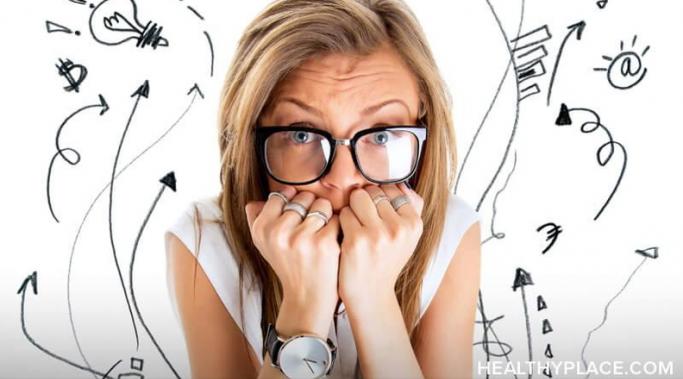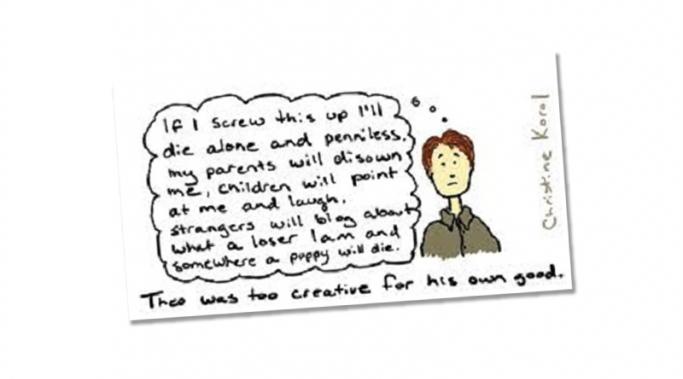Close your eyes for a moment and imagine: Suppose that one night there is a miracle, and while you’re sleeping your anxiety disappears. How would you know that it was really gone? What would be different? What would you notice the very next morning that would tell you that this miracle has occurred. What about others? What would they notice?
Does the possibility of such a miracle seem ridiculously outlandish? Something that can’t happen in the real world? Perhaps surprisingly, it really can happen.
Anxiety Treatments – Anxiety Schmanxiety
In the world of persuasive writing, convincing people that sex makes someone feel good is a pretty simple task. We are wired for it. When we can’t orgasm with someone else, we can do it ourselves. Men, on average, think about sex 19 times per day and women, on average, ten. So even under normal, non-anxious, circumstances, we know healthy sex generally makes us feel better.
But what about sex as an anxiety treatment (Anxiety Disorder Treatments Are Effective)? When I am anxious, overwhelmed, or even paranoid, having sex — or more specifically, reaching orgasm — makes me feel good. After I have an orgasm, the anxiety is almost always gone. Whether it is because the act itself distracts me, or the various chemical brain reactions of orgasm squash the anxiety, or some combination of both, what is undeniable is that it works.
Living with anxiety can be at best uncomfortable and at worst debilitating. Naturally, we want to overcome it. While there are no quick fixes, happily there are fixes. Anxiety treatment is quite personal, and there's a wide variety of approaches that people can explore to kick their anxiety to the curb.
Mindfulness is an amazing tool for all types of anxiety. Except when it isn't. Wait. What? Mindfulness is touted, rightly so, for its ability to lower blood pressure, reduce the amount of stress hormones in the blood, relax tense muscles, quiet racing thoughts, and soothe roiling emotions. Experts from all disciplines, from the sciences to the spiritual, offer solid evidence of the ability of mindfulness to decrease anxiety. Yet there are times when it does more harm than good. What do we do then?
Anxiety: worry, concern, apprehension, uneasiness, fear, agitation, angst, nervousness, tension. Anxiety: an awful state of being that encompasses our very being -- mind, feelings, actions. The Mayo Clinic describes it as “intense, excessive and persistent worry and fear about everyday situations." Many of us live with it; few, if any, of us want it. What do we do about it?
Anxiety takes many forms. No matter the type, chances are that it feels miserable. By making us feel different fears, worries, or panic or by creating within us obsessions and compulsions, anxiety disorders interfere with our ability to fully live life and enjoy relationships. The good news is, that no matter how extreme anxiety becomes, you don't have to live with it forever. There are ways to treat anxiety.
Like over 40 million people in the United States, I have an anxiety disorder. Two, actually: generalized and social. When living with anxiety, sometimes we're in control. Sometimes, though, anxiety is in control and it seems to chase and overpower us. I recently connected with psychologist and author Dr. Dan Peters, who calls anxiety the Worry Monster. That's apt. Just what does this monster do to people, and can we tame it?
It’s no secret that anxiety is very difficult to ignore. Anxiety can be loud and demanding, and as a result, we focus on it. It’s very natural for us to do that, but sadly, focusing on anxiety can make it grow. We need to ignore anxiety by focusing on what anxiety is not.
Fear. Terror. Worry. Obsessive thoughts. Anxiety and all of its manifestations can be crippling. The mind races with worst-case scenarios, and the anxious thoughts can be unrelenting. As if the thoughts themselves aren't bad enough, it's common for another worry to bubble to the surface of the mind plagued by anxiety: are these thoughts real, and can I trust them?
As if anxiety itself weren't bad enough on its own, it presents new challenges and frustrations when we decide to face it and get rid of it once and for all. Probably because anxiety disorders are so prevalent (together, they are the most common of all mental illnesses), there's a plethora of proposed ways to treat anxiety. Trying to decide what is best for you is itself anxiety-provoking.






